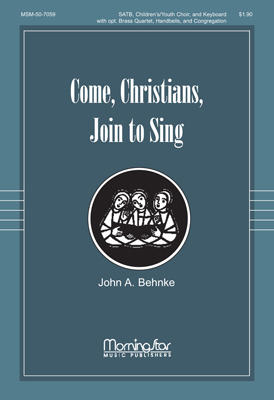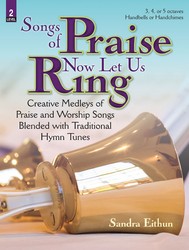Come, and let us sweetly join. C. Wesley. [Church Gatherings.] This poem of 22 double stanzas, divided into five parts, was given in Pt. ii. of J. & C. Wesley's Hymns & Sacred Poems, 1740, and headed "The Love Feast." The five parts were subsequently used as separate hymns, as follows:—
1. Come, and let us sweetly join. This was given in the Wesleyan Hymn Book, 1780, No. 505, and has been repeated in most collections of the Methodist body.
2. Come, Thou High and Lofty One. This was included in Toplady's Psalms and Hymns, 1776, and in the Wesleyan Hymn Book, 1780, No. 506 (ed. 1875, No. 520), and has passed into various collections. From it the centos (1) "Jesu, we the promise claim"; sometimes, "Jesus, we Thy promise claim," was given in Bickersteth's Christian Psalmody, 1833; and is found in modern hymnals, including Snepp's Songs of Grace & Glory, 1872; and (2) "In the midst do Thou appear," as in Dr. Martineau's Hymns, &c, 1840, and his Hymns of Praise & Prayer, 1873.
3. Let us join, 'tis God commands. This is No. 507 in the Wesleyan Hymn Book, 1780, and No. 521 in the revised edition, 1875. It has also passed into other collections, as the Baptist Hymnal, 1879, &c.
4. Partners of a glorious hope. No. 508 in the Wesleyan Hymn Book, 1780, and 522 in the revised edition 1875, and other collections.
5. Father, hail, by all adored. No. 509 in the Wesleyan Hymn Book, 1780, and 523, 1875.
In addition to the above there are three centos in common use all beginning, "Come, and let us sweetly join," and each being distinct in itself. These are (1) Leeds Hymn Book, 1853, No. 738; (2) New Congregational Supplement, 1869; and (3) Kennedy, 1863. The original texts of all these parts and centos are in the Wesleyan Hymn Book as above, and the Poetical Works, 1868-72, vol. i. p. 350.
--John Julian, Dictionary of Hymnology (1907)
Notes
Come, and let us sweetly join. C. Wesley. [Church Gatherings.] This poem of 22 double stanzas, divided into five parts, was given in Pt. ii. of J. & C. Wesley's Hymns & Sacred Poems, 1740, and headed "The Love Feast." The five parts were subsequently used as separate hymns, as follows:—
1. Come, and let us sweetly join. This was given in the Wesleyan Hymn Book, 1780, No. 505, and has been repeated in most collections of the Methodist body.
2. Come, Thou High and Lofty One. This was included in Toplady's Psalms and Hymns, 1776, and in the Wesleyan Hymn Book, 1780, No. 506 (ed. 1875, No. 520), and has passed into various collections. From it the centos (1) "Jesu, we the promise claim"; sometimes, "Jesus, we Thy promise claim," was given in Bickersteth's Christian Psalmody, 1833; and is found in modern hymnals, including Snepp's Songs of Grace & Glory, 1872; and (2) "In the midst do Thou appear," as in Dr. Martineau's Hymns, &c, 1840, and his Hymns of Praise & Prayer, 1873.
3. Let us join, 'tis God commands. This is No. 507 in the Wesleyan Hymn Book, 1780, and No. 521 in the revised edition, 1875. It has also passed into other collections, as the Baptist Hymnal, 1879, &c.
4. Partners of a glorious hope. No. 508 in the Wesleyan Hymn Book, 1780, and 522 in the revised edition 1875, and other collections.
5. Father, hail, by all adored. No. 509 in the Wesleyan Hymn Book, 1780, and 523, 1875.
In addition to the above there are three centos in common use all beginning, "Come, and let us sweetly join," and each being distinct in itself. These are (1) Leeds Hymn Book, 1853, No. 738; (2) New Congregational Supplement, 1869; and (3) Kennedy, 1863. The original texts of all these parts and centos are in the Wesleyan Hymn Book as above, and the Poetical Works, 1868-72, vol. i. p. 350.
--John Julian, Dictionary of Hymnology (1907)


 My Starred Hymns
My Starred Hymns







